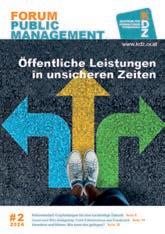

Gülsüm

















*Employed in the context of the Professional Integration HUB



















Gülsüm

















*Employed in the context of the Professional Integration HUB
















CConfidence is the engine that drives us forward, even when circumstances are challenging. Despite the uncertainty amplified by elections in Austria and the United States, as well as the difficult economic conditions marked by a high budget deficit and rising staff and energy costs, we succeeded in finding innovative solutions and pursuing a clear vision.
This annual report is a testament to that confidence and our collective commitment. It provides insight into the key topics and developments of the past year:
Municipal finances and autonomy:
Through our analyses of increasing transfer burdens and accurate municipal finance forecasts, we have provided valuable insights and a solid foundation for decision-making.
Quality management and resilience:
The advancement of the Common Assessment Framework has helped to strengthen quality and resilience in public administration.
Budget consolidation:
In the face of high budget deficits and mounting economic challenges, we have been able to develop key recommendations and strategies for the sustainable consolidation of the budget.
Working hours and new work models: Discussions around working time regulations and flexible models were defining topics. We actively facilitated these dialogues and played an instrumental role in the development of modern, future-oriented work structures.
Municipal services:
From early childhood education and climate action to municipal maintenance yards, we generated added value and new solutions for our members and partners through studies and consulting assignments.
International cooperation and public administration modernisation:
The BACID programme (Building Administrative Capacities in the Danube Region) and the SLPF initiative (Sustainable Local Public Finances) strengthened cross-border cooperation, helped drive administrative reforms, decentralisation, EU integration, and sustainable financial management.
These and many other projects represent the confidence that defines us as an organisation.
Our heartfelt thanks go to all those who through their dedication, ideas, and commitment made these achievements possible. Let us continue to carry this confidence forward and actively shape change together in the coming year.
THOMAS PROROK
Managing Director

PETER BIWALD
Managing Director
93
EXTERNAL CONSULTANTS
144 SEMINARS AND WEBINARS HELD
2,195
PARTICIPANTS TRAINED IN SEMINARS
99,172 VISITS TO KDZ.EU




KDZ – Centre for Public Administration Research is a non-profit association headquartered in Vienna. We are a competence centre and knowledge platform for the public sector, specifically for cities and municipalities, Länder, the federal government, and the European level. We think and act with a holistic and interdisciplinary perspective.
In the domains Public Management Consulting, European Governance and Urban Policy, Public Finances and Federalism as well as Training, we advocate for a high-quality public sector and develop made-tomeasure concepts and solutions to achieve this.
Our range of services includes applied research, consulting, and training, and our expertise has been in demand since 1969.

We support cities and municipalities as well as their companies, Länder, the federal government, associations, and NGOs with various issues related to organisational and administrative development, governance and management systems, citizen and customer services, and human resources management, and we provide support in strategy and innovation development.
The individual, customised, and needs-oriented solutions we provide help our clients harness their potential. A solution-driven approach, accuracy of fit, and feasibility are important benchmarks for us. A collaborative partnership, combined with transparent and professional project management, forms the essential foundation of sustainable, trustful, and reliable cooperation.
ORGANISATIONAL AND ADMINISTRATIVE DEVELOPMENT
CONTROL AND MANAGEMENT SYSTEMS
CITIZEN AND CUSTOMER SERVICES
STRATEGY AND INNOVATION DEVELOPMENT
PROJECTS IN 2024 HUMAN

We stand for good governance, transparency, and open government in Europe. Good cooperation between the federal government, Länder, and the municipalities as part of national governance is particularly important to us.
Our projects contribute to the continued development of federal structures and multi-level governance architectures, and in doing so, we also highlight the benefits of public action (public value).
As part of our focus on urban and city-region policy, we promote an intensive exchange of knowledge beyond Austria’s national borders, on the one hand. On the other hand, we facilitate city-regional initiatives, as we recognise that cities are always an integral part of the regions that surround them. Sustainability, participation, and quality in the public sector drive our actions.
This is particularly evident in our commitment to the UN sustainability development goals (SDGs) and the Common Assessment Framework (CAF).
We are a strong and steadfast partner in advancing the governance and financing of public services within the framework of multi-level governance.
Our goal is to bring more transparency to complex issues of the federal state. In so doing, we illuminate financial dynamics and cooperative engagement between the players involved. Moreover, we devise forward-looking models aimed at optimising governance and improving collaboration within federalism.
Our efforts contribute to achieving equitable and progressive fiscal equalisation, alongside strategically advancing key areas of responsibility such as nursing, education, childcare, public transport, or climate action. Another of our key priorities is to present Austrian municipal finances in a transparent manner and to strengthen their sustainability.

We have been a competent training partner for the public sector for many years. In using suitable concepts, methods, and always keeping pace with the times, our education and training work addresses the specific requirements of public administration.
A comprehensive network of experts and a pool of highly professional lecturers, trainers, and experienced practitioners from a wide range of different administrative units provide the foundation for our highly practical training.
After the restrictions of the pandemic years, we succeeded in addressing the fairly substantial backlog in demand for in-person training in 2024. With a well-structured programme tailored to the needs of administrative practice, we were able to conduct many trainings both onsite and online.
In summary, we look back on a challenging year of training. The impact of diminishing financial resources at the municipal level has also affected training opportunities. The prolonged financial distress of many municipalities is escalating, and the federal state as a whole needs to cut costs and urgently restore budgetary stability. In challenging times like these, it is all the more important to remain resilient and adaptable, ready to respond to new and unpredictable circumstances. These very skills – despite all adversities – can be fostered and strengthened through training.
As a recognised training partner for the public sector, we were pleased to welcome numerous clients to our practice-oriented specialised seminars and training programmes in 2024. Our training events covered key topics such as leadership and human resources, digitalisation and artificial intelligence, freedom of information and data protection, as well as legal updates. In addition, well-attended practice forums and networking events provided opportunities for participants to share practical experiences and specialised knowledge.
DIVERSITY OF TOPICS: WWW.KDZ.EU
• Economic efficiency and financial management
• Municipal budget reform (VRV 2015)
• Public management and governance
• Legal update
• Taxes and duties
• Leadership
• Communication and client management
• Innovation and digital competence
• KDZ practice forums and networks
The 2024 KDZ training year in numbers
2,195 PEOPLE ATTENDED OUR 144 SEMINARS ALL ACROSS AUSTRIA
17 IN-HOUSE SEMINARS WERE TAILORED TO INDIVIDUAL REQUIREMENTS
67% OF ALL THE TRAINING OFFERS WERE HELD IN PERSON AND 33% WERE HELD ONLINE (LIVE WEBINARS)
41 EXPERTS WERE INVITED TO GIVE LECTURES ON SPECIFIC TOPICS
97% OF THE SEMINAR CLIENTS WERE VERY SATISFIED AND SATISFIED












In 2024, many Austrian cities and municipalities faced challenging budgetary constraints. These cities and municipalities are facing stagnant revenues alongside a steady rise in expenditure. To address this situation, a variety of measures is required on both the revenue and spending sides to achieve a balanced budget.
In 2024, KDZ supported several cities and municipalities in addressing these challenges. This support will continue in 2025, as the financial situation is expected to remain difficult in the coming years.
The core element of our projects lies in working together with cities and municipalities to determine their need for consolidation. This specifically involves identifying the budget volume that needs to be adjusted in the subsequent process.
The process brings together working groups composed of top administrative officials, relevant departments, responsible political representatives, and KDZ experts who identify potential savings and assess them both in terms of their merit and their financial impact. The proposed measures are then

approved by a political steering committee, providing the basis for implementation in the municipality.
The proposed measures are diverse and include target group-specific adjustments to funding, achieving cost recovery of fees, a critical review of products and services, and the adjustment of service standards.
Several cities and municipalities have already succeeded in using this approach to get their budgets in order. However, critically reviewing and adjusting revenues, spending, and the underlying services as needed during the annual budgeting process remains essential.
The challenging budget situation will continue into 2025, and KDZ will be supporting budget consolidation efforts in a number of cities and municipalities in 2025 as well.
If you would like to make the most of the expertise supplied by an experienced team of professionals, we are happy to support you. Together, we will develop a tailored solution that fits the specific needs of your municipality. •

Employees are growing increasingly critical of the traditional 40-hour workweek standard. Surveys paint a relatively consistent picture: The majority of Austrians would welcome a reduction in working hours. While the call for rethinking the world of work is popular particularly among younger generations, it is not limited to them. There is growing demand for a shift that prioritises personal wellbeing, greater control over one’s schedule, more flexible working time models, and ultimately, self-fulfillment. Many employees would prefer flexible working hours and would prioritise leisure time and personal growth over traditional career paths. They would prefer four-day workweeks or part-time roles, even if it means accepting lower salaries.
Regardless of whether one agrees with the points being made in public discourse, it is clear that the world of work is changing, and new ideas and flexibility are in demand. The nature and scope of work are now additional crucial factors in being considered an attractive employer.
The new world of work: flexibility and fulfillment
At KDZ, we have had the opportunity to take an active role in an exciting development process looking at the future of working time for the city of Vienna over the past two years. This process has revealed that the challenges often lie in the details.
On the one hand, shorter working hours and more part-time roles could enhance employer attractiveness and employee health. On the other hand, financial, legal, and organisational hurdles pose significant challenges to implementation. With the “My FlexiTime” initiative, the city of Vienna has developed a response to the evolving demands of employees. The pilot project focuses on two areas: increasing working time flexibility by providing greater leeway in how weekly working hours are structured, on the one hand, and dual leadership (leadership model where two individuals share the management responsibilities of a single organisational unit), on the other.
Another line of inquiry in this project centred on the noticeably growing demand for part-time positions – not only among individuals with caregiving responsibilities. Many HR professionals report that in almost every second job interview, applicants inquire about part-time employment opportunities. To avoid losing strong candidates just before the finish line, organisations need targeted measures to adapt to these shifting expectations and offer attractive employment opportunities that meet the needs of the workforce. •
Municipal cooperation is a topics that receives varying levels of attention depending on the economic situation and political climate. One thing is clear: Complexity is increasing – also for cities and municipalities. In addition to the proper fulfilment of their responsibilities, maintaining operational capacity, delivering municipal services, and meeting required quality standards present ever-greater challenges for many municipalities. The necessary investments in municipal infrastructure, increasingly tight financial budgets, employee acquisition and the creation of an attractive work environment, digital work as well as digital services for citizens, and many other challenges, all demand new organisational solutions.
In 2024, KDZ supported a variety of municipal cooperation initiatives with a particular focus on the development of regional construction and maintenance yards. The following four key assumptions outline what is needed for such cooperation to pay off in the long term:
A common vision among decision-makers – ‘What do we want to achieve through cooperation, and what should be different or better afterwards?’ – provides a clear roadmap to guide the collaboration. By clarifying mutual expectations early on, misunderstandings can be avoided, laying a common foundation for future cooperation.
This frequently raised concern may seem justified at first glance. However, looking at previous successful municipal collaborations reveals a completely different picture. Mayors report that collaboration allows tasks to be carried out more efficiently, and with appropriate organisational regulations (as in procurement), equal access to operational resources like municipal maintenance yards is ensured. Additionally,
the employees’ sense of affiliation grows, as does the motivation to be part of a modern service organisation that operates both regionally and locally. Citizens, in turn, care more about the quality of services delivered than about which municipal employee provides them.
Collaborations create more than financial flexibility
Cost savings – for example, through shared facilities, vehicle fleets, or staff pools – typically emerge in the medium to long term. However, quality benefits can be realised from day one of collaboration. Municipal maintenance yards enable work in larger teams, making it easier to plan critical tasks, such as winter service. By sharing know-how and specialised equipment, municipalities can offer special services that were previously unavailable or expensive to outsource.
No collaboration model can succeed without actively engaging the employees. Transparency and opportunities for staff to become actively involved in the development of municipal cooperation projects are key to gaining acceptance and ensuring that collaboration works effectively in the long run.•

Municipality 2030
Cities and municipalities will face a wide range of challenges in the years ahead. However, these challenges also present numerous opportunities to explore new paths.
A key approach lies in further developing communication with citizens and their active engagement in municipal work. Citizens should be fully informed about the municipality’s circumstances, as transparency can foster greater public understanding of the decisions made by the municipality. A professional approach to communication – one that recognises and addresses the diverse communication needs of the different target groups – delivers significant benefits in this regard.
Furthermore, this presents an opportunity to involve citizens more extensively in municipal work through volunteering. Many municipalities already have success stories to tell, whether it’s libraries, meals on wheels services, public swimming pool management, or other municipal services. Strengthening volunteer engagement not only promotes a community spirit but also effectively helps to address staff shortages.
Given the current challenges in recruiting and retaining staff, it is essential for municipalities to position themselves as attractive employers. Part of this should involve valuing and supporting experienced employees as well as attracting new talent. Particularly when seeking and engaging new employees, innovative approaches are needed to ensure success and to design future-ready organisational structures.
Within the organisation itself, the digitalisation of core processes and the implementation of artificial intelligence (AI) offer significant opportunities for progress. Many processes in the workings of a municipality are highly standardised due to legal requirements but can be made more effective and efficient through digital solutions. AI, for example, offers a forward-looking solution for handling routine checks, such as the verification of document completeness.
The future holds numerous opportunities for cities and municipalities. The key will be to recognise these opportunities actively, seize them boldly, and implement them strategically to make municipalities future-proof and vibrant places to live. •














The road to Europe is rocky. Cities and municipalities are particularly affected, as they are neither official parties to the European integration process in the accession process nor EU members. This drives home how necessary it is to be well prepared for accession, as almost 70 percent of EU legislation affects the local level.
Such preparation is essential not only for activities that normally fall within the responsibility of municipalities, such as local transport, waste management, or environmental protection. Cities and municipalities also have significant responsibilities in areas such as freedom to travel, state aid, public procurement, competition, and services of general interest. In their role as employers, service providers, urban planners, monitoring and enforcement bodies as well as market players, local authorities are obliged to adopt and comply with the EU acquis communautaire in
their areas of responsibility. As their citizens’ first port of call on the road to Europe, they need to bring these citizens on board if the European project is to be successful.
At the same time, strong and adaptable administrative structures are fundamental to the success of transitioning from EU accession state to Member State. This need applies equally to all levels of government. For cities and municipalities, municipal autonomy is key in this situation: Generally, a high degree of municipal autonomy goes together with a high level of effectiveness, not only for a country’s democratic development, but also for effective governance.
We successfully responded to these challenges and achieved milestones in the countries of the Western Balkans and the Republic of Moldova through the BACID programme (2015–2024), which we implemented together with the Austrian Association of Cities and Towns. With the Regional School of Public Administration (ReSPA), for example, we were able to establish the Common Assessment Framework (CAF) as a quality management tool in the region’s public sector, contributing to reforms in public administration. In connection with decentralisation and bringing municipalities closer to the EU, the role of NALAS, the Network of Associations of Local Authorities of South-East Europe, was further strengthened. We are especially proud of the developments in digitalisation: A digitalisation expert supports the NALAS team, a permanent digitalisation group was established, and two digital pilot projects were implemented in Serbia and North Macedonia with smart parking space management and medical monitoring in people’s homes, improving the quality of life of people directly on the ground. •

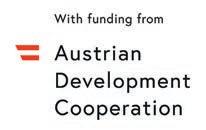

87,746
Cities and municipalities form the foundation of the European Union. They take on a variety of public responsibilities, from waste disposal to running schools and providing social support. However, this essential role comes with complex challenges.
One central aspect are the highly varied municipal structures in the Member States. While some countries rely on centralised systems, others have largely autonomous local governments. This heterogeneity is also reflected in the responsibilities and competencies that municipalities fulfil. The spectrum ranges from basic services to extensive functions, such as social security or urban planning. In light of this, so far, there are no uniform standards or comprehensive comparative statistics within the EU that would enable a cross-national analysis or evaluation of municipal services. Inconsistent definitions and classifications make it difficult to draw clear lines between the competencies of local, regional, and national governments. Not only does this lead to in-
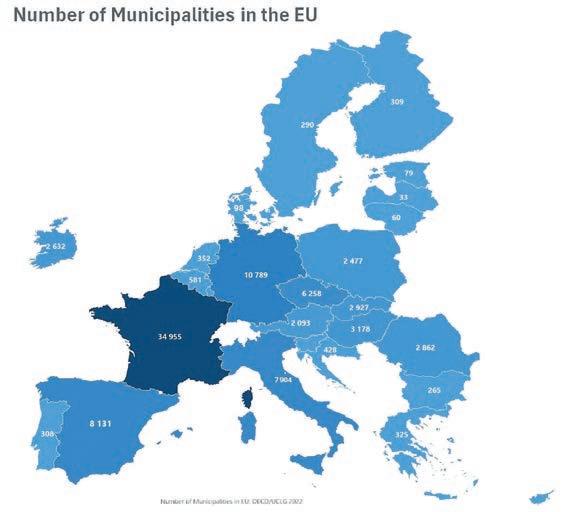
efficiencies, but it also limits the ability to share best practices between Member States or to develop common approaches at EU level.
However, efforts are being made to improve the situation. Institutions such as the OECD and the European Commission are working on tools such as the ‘Local Autonomy Index’, which assesses the degree of local autonomy and prepares the ground for harmonisation. At the same time, programmes such as the ‘World Observatory on Subnational Government Finance and Investment’ demonstrate how data can be systematised and made more comparable.
In 2024, KDZ conducted two studies, contributing to an overview of the municipal challenges in Europe: Firstly, a feasibility study on capacities, competencies, and career paths in cities and municipalities for the European Commission. Secondly, the ‘Municipal Finance Report of Southeastern Europe’, which compares municipal-level income and spending in 13 countries. It was shown that there are 87,746 municipalities in the EU. France leads the way with an impressive 34,955 municipalities, whereas countries such as Denmark only have 98 local governments. This illustrates the enormous diversity of municipal structures and at the same time the extensive challenges that reform efforts face in the EU Member States. •
Networks between organisations, cities, and academic partners open up the opportunity to learn from one another. An extensive network comprising 18 partners, including countries like Argentina, Canada, or South Africa concluded its work –at least officially – with a memorable closing event in Vienna. KDZ hosted the final conference of LoGov – Local Government and the Changing Urban-Rural Interplay, an EU Horizon 2020 project in which KDZ was involved as a partner.
The results are impressive: 16 country reports, 5 research area reports, 3 books, and 1 whitepaper were authored and made available at www.logov-rise.eu. The whitepaper presents 30 practical examples from around the world on highly relevant issues in local government, ranging from public transport and housing to municipal revenues, intermunicipal cooperation in rural areas, the role of municipal associations, and citizen participation in local planning and budgeting. In addition to gaining important insights, KDZ was able to connect with many new partners who are committed to sustainably strengthening the municipal level across the globe.
Another network organised by KDZ marked its tenth anniversary in 2024: the European city network ‘Cities for Sustainable Public Finances’ (www.cspf.eu). This network brings together finance managers from the cities of Bordeaux, Hamburg, Amsterdam, Barcelona, Trondheim, and London twice a year to exchange ideas. At the first meeting in 2024, the relationship between environmental sustainability and sources of financing was examined, in response to the new EU requirements (keyword ESG – see also the Innovation chapter) for directing financial flows into sustainable economic sectors which also have an impact on cities and their municipal enterprises. The second virtual meeting was dedicated to the topic of ‘affordable housing’. The European cities openly shared their approaches, successes, and challenges.
The long-term nurturing of networks creates trust between members and facilitates the exchange of resources and knowledge. Among other things, to our mind, networks are also a central learning format for adult education, as our experience with the KDZ networks Citizen Services, Human Resources, and Resilient Communities has shown. KDZ will certainly continue to actively explore new opportunities in order to promote the strengthening of the municipal sector in internal and external networks. •


In the year ahead, we can look forward to exciting projects that will help us achieve the UN Sustainable Development Goals (SDGs). One of these important projects is the EU-funded ‘Sustainability in Local Public Finances’ (SLPF) project, which is developing concrete measures for sustainable financial management in cooperation with the cities of Amsterdam, Barcelona, Bordeaux, and Hamburg.
The project is scheduled to run until December 2026 and aims to integrate innovative approaches such as SDGs and green budgeting into local financial planning. The objective is to progress in key areas such as climate action, social justice, and economic sustainability.
The SLPF project follows a clearly structured roadmap: from the analysis of existing SDG governance systems and budgeting practices to the development of city-specific action plans and the organisation of a Europe-wide exchange programme for civil servants. The aim is to support cities in consistently aligning their public finance systems with the SDGs and learning from one another.

In August 2025, the first concrete results will become available in a status quo report. This report will analyse the strategies and concepts the participating cities have been using so far to implement the SDGs. The analysis will be supplemented by a review of relevant legal, financial, and strategic documents at EU, national, and local level. Local experts will also be examining how financial resources are being used for SDG-related measures. An intensive dialogue with key stakeholders will provide additional insights and underpin the report’s recommendations.

Action plans with measurable SDG key performance indicators (KPIs) are created on the basis of the status quo reports. These plans include timetables, milestones, and the active participation of relevant stakeholders. Particular attention is devoted to practical solutions that can also be used by European municipalities other than the project cities.
One example of an innovative approach is the development of a digital dashboard for green budgeting. This tool provides cities with an overview of the different ways financial resources can be used and how they contribute to achieving the SDGs. Synergies with partner organisations such as Expertise France and the Institute for Climate Economics (I4CE) have added value to the project, particularly in the areas of climate finance and sustainable urban development.
Austrian cities are drawing on the findings of the SLPF project for their work. The aim is to adapt green budgeting and other innovative approaches to local conditions and link them to existing projects, for example in the fields of urban mobility or climate adaptation. In this way, the project contributes to sustainable development in Europe while also providing valuable takeaways for Austria’s sustainable future.
The SLPF project will evidence the important role that cities can play in shaping a sustainable future. They serve as testing grounds for innovative financing models and are setting new standards in public financial management. Together with the project partners, the city administrations are providing a powerful impetus, the impact of which extends far beyond local borders. The innovative approaches taken by the four participating cities can serve as benchmark standards and create a ‘ripple effect’ that serves as an inspiration for other cities and countries to adopt sustainable financial solutions.
This project is funded by the European Union through the Technical Support Instrument and is being implemented by Expertise France, KDZ – Centre for Public Administration Research, and I4C in cooperation with the European Commission. •
You can download the fact sheet on the SLPF project at this link: www.slpf.eu










KDZ – Centre for Public Administration Research has been publishing the creditworthiness rating of the top 250 municipalities together with the municipal magazine public every summer for the past 13 years. The rating presents the financial performance of all Austrian municipalities based on a mix of different factors.
Results are informed by the KDZ Quick Test, which comprises a set of indicators that have been tried and tested in practice over many years. It analyses whether a municipality has sufficient financial leeway to cover its operating expenses and make investments. In addition to ongoing operations, investments, investment grants, and debt, the analysis also takes into account debt. The resulting key figures, based on a differentiated grading scale, provide an overall assessment of a municipality’s financial development.
The rating reveals the top 12 percent of all municipalities with the best credit score. To achieve a place among the top 250 in 2024, a credit rating of 1.80 was required, i.e., a very good score. A credit rating of 2.69 was required for 1,047th place. In other words, half of the Austrian municipalities had a very good to good financial performance in this year’s rating.
Over the last 13 years, 22 municipalities have always been in the top 250 of the rating. These include municipalities like Hallwang (average score of 1.26), Ebbs (1.28), and Sankt Margarethen in Burgenland (1.57). Six Länder are represented among these 22 municipalities. No municipality in the Länder of Carinthia and Vorarlberg has consistently made it into the rating.
The KDZ Quick Test values for the 2025 rating are already available on www.offenerhaushalt.at
The transparency platform for municipal budgets, which is currently used by around 1,550 municipalities, offers the option of displaying the KDZ Quick Test along with the three-component budget. With an excellent score of 1.91 for the first-placed municipality in the ‘perpetual table’ – the municipality of Hallwang – a very good score was once again achieved for 2024. The revenue-expenditure gap is already making itself felt, however, as this result lies below the 1.26 credit rating for the period 2012–2024.
Every year, the rating elicits numerous reactions from both municipalities in the top 250 and those outside the top tier. Municipalities that have not reached the top 250 are primarily interested in their own rating. •

finanzbericht (municipal financial report)
Fact sheet: ‘Finanzausgleich kompakt’ (fiscal equalisation at a glance)
Municipal financial forecast
While the high need for consolidation only became apparent at a national level in autumn 2024, our municipal finance forecasts revealed this sustained slump in financing starting in early 2024. The revenue-expenditure gap in the municipalities has been visible for quite some time. On the one hand, the gap is due to a tax reform without offsets, which has curbed revenue, and, on the other hand, it is due to inflation and the sharp increases in levies.
Through our work, we would like to do our part in advancing the federal state, even if available financial resources are diminishing.
The new financial equalisation scheme came into force on 1 January 2024. In February, we organised an impulse conference entitled ‘Financial equalisation 2024 – stronger into the future?’ in collaboration with TU Wien. This conference provided a critical all-encompassing view of the 2024 financial equalisation scheme from a wide range of perspectives. To our regret, it hardly came as a surprise when nearly half the participants gave the response ‘I would have expected more from the financial equalisation scheme’. Even though some important measures have been implemented, a fundamental reform has yet to be achieved. If a reform had been initiated earlier, the pressure to consolidate would perhaps already be lower today.
In August, we successfully published our financial equalisation manual 2024. This manual, which KDZ has been producing for decades, is regarded as a reference work on financial equalisation. It contains not only the commentary expanding on the Fiscal Equalisation Act and the Fiscal Equalisation Pact, but also an explanation of how fiscal equalisation works and is structured as well as many in-depth assessments and recommendations on fiscal equalisation.
In cooperation with the Fiscal Advisory Council and the Austrian Institute of Economic Research (WIFO), we hosted a press conference on reforms to the federal state in October. As part of these recommendations to the new federal government, a host of reform strategies geared to increase efficiency in the federal state and thus contribute to consolidation work in the future were presented.
There is still much to be done, and we will be happy to continue providing our expertise moving forward. •

In recent years, municipalities have committed to significant investments in childcare, contributing to a steady expansion of childcare services. They have allocated increasing amounts of funding for these services, despite not receiving additional resources from fiscal equalisation schemes to sustain ongoing operations. However, in the coming years, municipalities will need to tighten their fiscal belts. But how will this affect the planned expansion of early childhood education??
KDZ explored this question in a study it conducted on behalf of the Austrian Association of Cities and Towns to explore this question. What are the current goals in early childhood education, and what are their financial implications? What developments

have there been in terms of the services available and spending. What lies ahead in terms of staffing needs and funding?
Early childhood education is a rapidly growing sector. Between 2007 and 2022, the need for childcare funding at the municipal level increased threefold, signifying an average annual increase of 7.7%. To put this in perspective, the consumer price index rose by only 41% during the same period. This growth correlates with a significant increase in childcare coverage, particularly for children under the age of three, along with notable improvements in opening hours.
Our study results indicate that the anticipated initiatives in early childhood education will require an additional EUR 6.9 billion in financing (before deducting funding) between 2024 and 2030.
Alongside the widening gap between revenues and spending, the need for funding has been growing substantially as a result of raising the childcare coverage rate by at least one percentage point per year and Land. In addition, longer opening hours and smaller group sizes are also leading to added costs.
Overall, it has become clear that maintaining the current trajectory is key to ensuring that the established expansion goals are actually achieved. However, given the mounting financial constraints that municipalities are facing, this will be difficult to achieve. While resources from the Future Fund provide critical support, they will not be able to fully cover the additional funding needs. In light of this, there is a real risk that the planned expansion targets in early childhood education may not be met. •

will be characterised by a nationwide need for fiscal consolidation. KDZ will leverage its expertise to offer solutions at various levels, placing a particular focus on highlighting municipal financing options to enhance the financial flexibility of municipalities.
To this end, we will outline consolidation opportunities for municipalities and support them throughout the process. The key objective is to preserve the political scope for action available to municipalities despite the tight fiscal situation. Priority issues include rethinking regional cooperation through intermunicipal partnerships, establishing benchmarks, introducing cost-covering fees, or exploring alternative financing instruments.
Additionally, we will seek to facilitate the improvement of municipal framework conditions. Topics will include the property tax reform, Länder-level fiscal equalisation schemes, or the creation of a sustainable municipal investment fund, which remains to be implemented. Against this backdrop, financing and managing early childhood education and climate action will also be crucial topics in 2025.
There will also be additions to our www.offenerhaushalt.at platform.
We plan to provide a benchmarking tool for the individual municipalities, which will allow them to learn more effectively from one another. It goes without saying that we will continue our municipal finance forecasts and work on improving green budgeting feasibility. •
• Identifying potential for consolidation at the municipal level
• Ensuring the medium-term financial sustainability of municipal services of general interest
• Contributing to reforms in fiscal equalisation and public service financing with a focus on the long-term financial viability of the federal system
• Studying the impact of climate action and climate change adaptation on public budgets and multi-level governance
• Financing investments such as early childhood education, climate action, and climate change adaptation
• Ensuring transparent finances at municipal level, for instance by continuing municipal finance forecasts and expanding www.offenerhaushalt.at











Austria’s municipal maintenance yards are still struggling with the stigma of being ‘inefficient’. The common stereotype suggests that ‘those workers in orange uniforms are just waiting around for jobs to do’. However, this perception is far from accurate, as a closer look at the operational structure of modern municipal maintenance yards quickly reveals.
Every day, a large number of assignments are performed in these yards. Without careful planning, prioritisation, and allocation, managing such a workload would often no longer be manageable in terms of the day-to-day organisation of work.
At a specialist seminar in 2024, Markus Maier, head of the Aschachtal municipal maintenance yard, outlined how this workload can be managed successfully. The Aschachtal municipal maintenance yard is a successful collaboration between the municipalities of Aschach an der Donau, Hartkirchen, Pupping, and Stroheim. It covers an area of approximately 13 hectares, manages a road network of 281 km and around 68 km of sewer lines, in addition to handling typical responsibilities such as winter service and green space management. A team of 17 employees ensures smooth operation of the yard.
A ‘command centre’ coordinates assignments for the four member municipalities. A work order system was developed in-house, seamlessly integrating assignment plans, which are then made electronically available to employees.
Alongside individual assignments from the four municipalities, the yard also manages, plans, and allocates standing orders, i.e., services that are
carried out automatically without having to be specifically requested. Assignment recording is systematically structured to log tasks that need to be completed, estimate the resources required, and then incorporate the tasks into daily and weekly plans.
Once an assignment has been completed, the results are (generally) photographed for documentation purposes, and employees log the time spent on each assignment. This data also feeds directly into any required billing.
In total, a seamlessly integrated system has been developed, allowing for structured allocation of work among employees based on job orders as well as performance tracking. This has resulted in a more efficient performance of maintenance yard services, improved resource planning, and thus also greater employee satisfaction, as daily, weekly, and monthly schedules provide clear guidance on what tasks need to be taken care of. The key success factor: a dedicated management team and committed employees.
The efficiency of the Aschachtal municipal maintenance yard is so impressive that we felt compelled to present this best practice to other municipal maintenance yard managers in a KDZ seminar. The event sparked thought-provoking discussions, admiration, and many valuable insights – leaving attendees with a clear understanding of ‘how it can be done’.
We look forward to further inspiring discussions, suggestions, and ideas for successful municipal maintenance yard management in 2025. •

It is generally understood that there are essentially two lenses through which challenges can be viewed: the problem-focused lens and the solution-focused lens. Whereas the problem-focused lens primarily seeks to analyse and understand the root causes of an issue, the solution-focused lens shifts attention to the strengths of employees, even in difficult situations, unlocking hidden skills and opportunities. Both perspectives have their merit, but the solution-focused approach is characterised by a mindset geared toward growth and development.
The webinar series ‘Managing & Leading’ explores this shift in perspective – from analysis to solution development in leadership work. Designed as a digital workshop for next-generation/young and experienced leaders, the webinars address various aspects of leadership: fundamental principles of effective leadership, actual leadership work following the leadership process cycle of reflection and interaction, successful communication and functional conflict resolution, as well as the challenges and opportunities of organisational development from a leadership perspective.
In terms of methodology, this innovative leadership development format emphasises peer learning among participants, complemented by
expert insights from trainers. In breakout sessions, participants reflect on their own leadership experiences or practices, document their insights on a Mural board (a digital flipchart). They then reconvene in the larger group to contextualise these insights with theoretical knowledge. Such a hands-on approach to training – based on real-world cases – lays the foundation for refining one’s individual leadership skills. What works well in one case is likely to prove effective in similar situations. At the same time, this method helps participants break free from the pressure of perfectionism: Not everything can or will always work out.
Leadership styles are, of course, highly individual. That said, effective leadership needs to grasp and navigate the complexity of real-world challenges while also providing a clear sense of direction in administration by taking (actual) decisions. Achieving this requires participative, transactional, or transformational leadership styles (to name just three), or any combination of these different approaches. Ultimately, leadership is shaped by the individual leader’s self-perception – so by the ‘lens’ they choose to adopt – and the practical demands of everyday organisational life. Developing, practicing, and having the confidence to consistently adopt the solution-focused lens is the key to success. •

Based on our experience, networks are highly effective learning environments, as they are specifically tailored to the unique demands of adult learning. The distinctive merits of such a collaborative learning approach mainly include opportunities to engage in social exchange and peer learning, joint problem-solving by leveraging diverse personal experiences and collective knowledge within the network to address complex challenges, and to create a safe space for feedback from like-minded individuals.
Networks based on long-term relationship building
In recognition of these unique benefits, KDZ has developed various networks over the years. Three examples are briefly presented below:
Netzwerk Bürgerservice
(Citizen Service Network)
For over 30 years, citizen service centres have embodied the service orientation of cities and municipalities. KDZ established a platform for exchange and collaborative learning early on. What began as a series of seminars and training programmes has evolved into a network that brings together approximately 25–30 participants from across Austria each year. Topics such as digitalisation and artificial intelligence, most recently discussed at the network’s

meeting in Tulln, have been playing an increasingly important role.
Führungskräftewerkstatt Burgenland
(Leadership Workshop Burgenland
In 2018, Burgenland’s regional group of the Austrian Association of Cities and Towns launched a network for chief administrative officers. It includes representatives from the larger cities of Burgenland. The meetings facilitate personal exchange and drive the development of practical solutions, such as an organisational manual (template) and a concept for an internal monitoring system.
The COVID-19 pandemic brought challenges like the shift to working from home that required quick action. In response, KDZ initiated an online workshop, that continues to meet up regularly to this day. This network, made up of 14 HR managers from various cities and municipalities, focuses primarily on topics related to modern staff management.
For a network to succeed over the long run, effective facilitation and guidance are of the essence as it fosters structure, accountability, openness, and reflection within the group. KDZ has stepped into this role, creating effective spaces for trusted exchange, problem-solving, and mutual support, ultimately making networks an indispensable tool in adult education. •

Embracing challenges – investing in training! The fast-paced evolution of artificial intelligence will fundamentally change the way we work. Speed and complexity are increasing, driven in part by digitalisation. Our working world is becoming increasingly technology-driven, with people, machines, and media engaging collectively in networks on a large scale and learning from each other. Change in general, and digitalisation in particular, are thus also key drivers for training and skills development. After all, the success of organisations largely depends on the resources available to them, making it essential to recognise the value of professional growth and give employees opportunities to invest in their future and skills, empowering them to confidently tackle the challenges of tomorrow – especially in an unpredictable VUCA world. Continuing knowledge acquisition is a fundamental requirement for any modern organisation, as it creates added value for all while also ensuring satisfied and motivated employees.
As a training provider, we are committed to supporting you in your training initiatives.
NEW in the programme:
‘Workforce development in transition: forward-looking approaches for public administration’ Discover innovative approaches to staff and organisational development in four modules and empower your employees to acquire the skill sets needed for the digital and AI-driven workplace of tomorrow. This course is specifically intended for chief administrative officers, HR professionals, organisational and staff developers, and executives. It covers AI and its impact on human resources and provides labour law updates. One online module focuses on employer branding, strategic recruiting, and HR marketing. Another module explores New Work and its potential for the public sector. Finally, the course concludes with an examination of staff and organisational development methods. •
THE CAF CENTRE WILL CONTINUE TO EXTEND ITS ROLE AS AN INTERNATIONALLY RECOGNIZED COMPETENCE CENTRE FOR QUALITY, CHANGE, AND GOOD GOVERNANCE IN THE PUBLIC SECTOR!
The CAF Centre1 of KDZ has blossomed into an internationally sought-after and recognised CAF centre. In 2024, it was able to further strengthen its position as a ‘first-contact-point’ on all issues related to CAF, good governance, and administrative innovation.
In 2024, we were able to expand our CAF activities not only in Austria but also in Germany. In addition to supporting various CAF Quality Label processes, the CAF Centre of KDZ facilitated the implementation of the Common Assessment Framework in various public administration organisations across Germany.
2024 saw the development of a streamlined CAF version, known as CAF-Compact, making the CAF methodology even more effective for organisations. Additionally, in 2024, development began on a digital CAF tool in collaboration with BMKÖS (Austrian Federal Ministry for Arts, Culture, the Civil Service and Sport). This tool will provide quality managers and public administration leaders with quick access to CAF-based organisational assessments. Together with FH Campus Wien Academy, the CAF Centre crafted a custom-made curriculum for quality managers and organisational developers in the public sector. The aim is to integrate CAF as a practical and effective framework for continuous improvement in leadership and expert training programmes.
Another one of the year’s highlights was the CAF Centre’s participation in Innovate 2024, the public sector conference on innovation management. KDZ, together with BMKÖS, had the honour of officially awarding the CAF Quality Label to seven organisations during the prestigious event at the Vienna Hofburg.

The CAF Centre at KDZ is also a sought-after expert for the advancement of CAF and the implementation of international CAF training. At the invitation of the European Institute of Public Administration (EIPA), we ran a multi-day training session in Maastricht for CAF trainers from various countries. Additionally, the CAF Centre participated in international project proposals (e.g., CAF Resilient City), further boosting its position as a highly sought-after international partner for quality, change, and good governance.
Another significant milestone was achieved in the BACID III programme. Building on the successes of BACID II, the CAF Centre of KDZ has been supporting the Regional School of Public Administration in their effort to establish a Regional Quality Management Centre (RQMC), thereby strengthening CAF’s presence in the Western Balkans. Alongside numerous CAF implementations, 2024 saw the expansion of the network of CAF evaluators (EFAC) and CAF trainers. •







300
ORGANISATIONS IN THE PUBLIC SECTOR AND NPOS IN AUSTRIA USED CAF
16 NATIONAL AND INTERNATIONAL CAF PROJECTS HAVE BEEN IMPLEMENTED
24
AUSTRIAN ORGANISATIONS HAVE BEEN AWARDED CAF CERTIFICATION
4.000
ORGANISATIONS IN THE PUBLIC SECTOR IN EUROPE ARE REGISTERED CAF USERS
250 ORGANISATIONS IN EUROPE HAVE BEEN AWARDED CAF CERTIFICATION SINCE 2015

The CAF Centre leverages the potential of digitalisation and was able to continue its activities in 2024 with remarkable success, including virtually. As a result, it expanded its international network and strengthened collaboration with organisations in Austria and Germany.
The CAF Network Germany-Austria and cooperation with local CAF partners were progressively expanded. 2024 saw the establishment and further development of shared activities and offerings within the framework of CAF webinars as well as the CAFFEX exchange between the countries.
Another significant milestone was achieved in the BACID III programme: Building on the successes of BACID II, the CAF Centre of KDZ supported the Regional School of Public Administration (RESPA) in establishing a Regional Quality Management Centre (RQMC) from 2021 to 2024, thereby strengthening CAF’s presence in the Western Balkans. The project was successfully completed in 2024 with a track record of 13 CAF implementations and 13 CAF quality label processes. The many activities in these countries have firmly established CAF as an approach for sustainable quality development, change, and good governance. CAF is now institutionally represented by the RQMC.
With the CAF Practitioners Network, the CAF Centre at KDZ has launched the first international CAF network, inviting CAF organisations, quality managers, and organisational developers operating around the world to participate in regular, moderated exchanges and to further develop their skills. Since 2022, a total of 7 online events have been held, facilitating the meaningful exchange of experiences and expanding the international CAF community to include approximately 150 participants from 16 different countries.


How does the CAF contribute to quality development, change, and the innovative capacity of public administrations? The CAF Centre explored this question in an international survey that saw participation of 197 organisations worldwide. The results will be presented for the first time in early 2025 at the CAF Practitioners Network.
CAF implementation
CAF was implemented successfully in a total of 15 Austrian and international projects. •
CITIES/MUNICIPALITIES
Abtenau
Adnet
Altach
Altlengbach
Altenberg bei Linz
Altmünster
Amaliendorf-Aalfang
Ampflwang i. H.
Amstetten
Andorf
Anif
Ansfelden
Arnoldstein
Aschach an der Donau
Asperhofen
Asten
Atzenbrugg
Au am Leithaberge
Bad Aussee
Bad Goisern
Bad Ischl
Bad Radkersburg
Bad Vigaun
Bad Vöslau
Baden
Bad Pirawarth
Bärnbach
Berg
Bergheim
Berndorf
Biedermannsdorf
Bludenz
Böheimkirchen
Brand-Laaben
Braunau
Bregenz
Brixlegg
Bruck/Mur
Bruck an der Großglocknerstraße
Brunn/Gebirge
Buchkirchen
Bürmoos
Deutschfeistritz
Dornbirn
Ebenau
Ebreichsdorf
Eferding
Eisenstadt
Elixhausen
Engerwitzdorf
Enns
Erlauf
Eugendorf
Fehring
Feldbach
Feldkirch
Fischamend
Fohnsdorf
Frankenburg a. HR.
Frastanz
Frauenkirchen
Freistadt
Frohnleiten
Fürstenfeld
Gablitz
Gänserndorf
Gallneukirchen
Gaming
Gampern
Gars/Kamp
Gaschurn
Gattendorf
Gerasdorf b. Wien
Gloggnitz
Gmünd
Gmunden
Goldegg
Gols
Gratkorn
Gratwein-Straßengel
Graz
Gröbming
Grödig
Grosshöflein
Gumpoldskirchen
Gunskirchen
Guntramsdorf
Güssing
Hallein
Hart bei Graz
Heiligenkreuz im Lafnitztal
Henndorf am Wallersee
Hernstein
Herzogenburg
Hinterbrühl
Hofamt Priel
Hof bei Salzburg
Hofstetten-Grünau
Hopfgarten
Horitschon
Hornstein
Innsbruck
Irdning-Donnersbachtal
Judenburg
Kaltenleutgeben
Kapfenberg
Kennelbach
Kirchberg-Thening
Kirchdorf a. d. Krems
Klagenfurt
Klausen-Leopoldsdorf
Klosterneuburg
Knittelfeld
Köflach
Korneuburg
Kottingbrunn
Krems
Kremsmünster
Krumbach
Kufstein
Kumberg
Laakirchen
Lamprechtshausen
Landeck
Längenfeld/Tirol
Langenlois
Langenzersdorf
Lassee
Laxenburg
Lanzenkirchen
Leibnitz
Lendorf
Leoben
Leobendorf
Leobersdorf
Leonding
Lichtenau im Waldviertel
Lienz
Liezen
Linz
Loipersdorf
Loosdorf
Lustenau
Magdalensberg
Mannersdorf am Leithagebirge
Maria Enzersdorf
Maria Saal
Mariazell
Markt Allhau
Mattersburg
Mattighofen
Mattsee
Mauthausen
Micheldorf in Oberösterreich
Mistelbach
Mitterndorf an der Fischa
Mittersill
Mödling
Mörbisch
Mondsee
Mürzzuschlag
Nenzing
Neudörfl
Neufeld an der Leitha
Neuhofen/Krems
Neuhofen/Ybbs
Neulengbach
Neunkirchen
Neusiedl/See Nickelsdorf
Niederndorf
Nußdorf-Debant
Oberalm
Ober-Grafendorf
Oberndorf in Tirol
Oberpullendorf
Oberwaltersdorf
Oberwart
Olbendorf
Ossiach
Pasching
Passail
Perchtoldsdorf
Persenbeug-Gottsdorf
Perg
Pfaffstätten
Pöchlarn
Pregarten
Prellenkirchen
Pressbaum
Puch bei Hallein
Puchenau
Pupping
Purkersdorf
Rankweil
Regau
Reutte
Rohrbach in Oberösterreich
Rosegg
Rum
Rust/Neusiedler See Saalfelden am Steinernen Meer
Salzburg
Schärding
Scharnstein
Scheibbs
Schladming
Schwadorf
Schwechat
Seekirchen
Semriach
Sieghartskirchen
Spittal/Drau
Sankt Andrä/Lavanttal
Sankt Andrä-Wördern
Sankt Barbara im Mürztal
Sankt Florian am Inn
Sankt Georgen
Sankt Jakob im Rosental
Sankt Johann i. d. Haide
Sankt Johann/Tirol
Sankt Peter am Kammersberg
Sankt Peter in der Au
Sankt Pölten
Sankt Thomas am Blasenstein
Sankt Ulrich bei Steyr
Sankt Valentin
Seiersberg-Pirka
Stadl-Paura
Stanz im Mürztal
Stetten
Steyr
Steyregg
Stockerau
Straß in der Steiermark
Straßwalchen
Strobl am Wolfgangsee
Schwertberg
Tamsweg
Teesdorf
Telfs
Ternitz
Thal
Thalheim/Wels
Traisen
Traiskirchen
Traismauer
Traun
Traunkirchen
Trieben
Trofaiach
Tulln
Tullnerbach
Uttendorf
Villach
Vöcklabruck
Vöcklamarkt
Voitsberg
Vösendorf
Waidhofen/Thaya
Waidhofen/Ybbs
Waidmannsfeld
Wald im Pinzgau
Waldhausen im Strudengau
Walding
Wallern im Burgenland
Wartberg ob der Aist
Weissenbach/Tr.
Wels
Werfenweng
Weyer
Wiener Neudorf
Wiener Neustadt
Wieselburg
Wieselburg-Land
Wilhelmsburg
Windigsteig
Wolfsberg
Wolfurt
Wolkersdorf im Weinviertel
Wöllersdorf-Steinabrückl
Wörgl
Zell am See
Zeltweg
Zwentendorf an der Donau
Zwettl
New members 2024
ARGE der Stadtamtsdirektoren, Lower Austria
BANK AUSTRIA
Federal Chamber of Labour
Erste Bank Sparkassen AG
EURAC Research
GBV – Austrian Federation of Limited-Profit Housing Associations
Krems Municipal Association (Gemeindeverband Krems)
Municipal Association for Waste Management in the Schwechat area
(Gemeindeverband für Abfallwirtschaft im Raum Schwechat)
Zwettl Municipal Association (Gemeindeverband Zwettl)
Federation of Austrian Industries
Carinthian Fire Fighter Association (Kärntner Landesfeuerwehrverband)
Community Management Academy of Lower Austria
Communal Joint Office for Administrative Management (KGSt)
Land Carinthia, Dpt. 3 Municipalities and Disaster Management
Land Styria, Dpt. 17 Land and regional development
Land Salzburg, Dpt. 1 Economy, Tourism and Municipalities Department
Land Vorarlberg, Dpt. IIIa Financial Issues and IIIc Auditing
Vorarlberg Court of Audit
Lebenshilfe Bruck – Kapfenberg gemeinnützige GmbH
Lebenshilfe Ennstal
Lebenshilfe Leoben
Lebenshilfe Mürztal
Upper Austrian Court of Audit
Association of Austrian Cities and Towns
Raiffeisenlandesbank Burgenland und Revisionsverband eGen
Raiffeisenlandesbank Niederösterreich-Wien AG
Regional Planning Association Großes Walsertal
Salzburg Court of Audit
Tyrol Court of Audit
Association of Social Democrats Community Representatives in Lower Austria
(Verband sozialdemokratischer Gemeindevertreter in NÖ)
Verein Region Vorderland Feldkirch
Volksbank Wien AG
Vorarlberg Association of Municipalities (Vorarlberger Gemeindeverband)
Wiener Städtische Versicherung
Matthias Stadler, Mayor of St. Pölten (President)
Werner Krammer, Waidhofen an der Ybbs (Vice President)
Tina Blöchl, Vice Mayor of Linz
Angelika Flatz, CEO Wiener Wohnen Kundenservice GmbH
Karin Mathé, Municipal Department of the City of Vienna
Andreas Thaller, Federal Ministry of Education, Science and Research
Thomas Weninger, Association of Austrian Cities and Towns
Martin Zojer, UniCredit Bank Austria AG

ADA – Austrian Development Agency
CAF – Common Assessment Framework
CEMR – Council of European Municipalities and Regions
CEP – European Policy Centre
Cooperation OGD Austria
EIPA – European Institute of Public Administration
Council of Europe – Congress of Local and Regional Authorities
Fiscal Advisory Council Austria
Management Forum for Innovative Public Service
Foster Europe
IDM – Institute for the Danube Region and Central Europe
IFIP – Department of Public Finance and Infrastructure Policy of TU Wien
KGSt – Communal Joint Office for Administrative Management
KMA – Knowledge Management Austria
Competence Centre for Infrastructure Economics, Public Services and Social Provisioning
NALAS – Network of Associations of Local Authorities of South-East Europe
OECD – Sigma
ÖVG – Österreichische Verwaltungswissenschaftliche Gesellschaft (Austrian Administrative Society)
PA 10 – Priority Area 10 of the EU Strategy for the Danube Region
RESPA – Regional School of Public Administration
UCLG – CIB – Capacity and Institutions Building (United Cities and Local Governance)
VÖWG – Austrian Association for Public and Social Economy
WIFO – Austrian Institute for Economic Research



Elisabeth ALBER, EURAC Research, Bolzano
Peter BIEGELBAUER, AIT Austrian Institute of Technology GmbH
Stefan BRUCKBAUER, Bank Austria
Professor Peter BUSSJÄGER, University of Innsbruck, Institute for Public Law, Constitutional and Administrative Studies; Institute for Federalism
Professor Franziska CECON, University of Applied Sciences, Linz
Professor Thomas DÖRING, University of Darmstadt
Annegret EPPLER, Kehl University of Public Administration
Professor René GEISSLER, Technical University of Applied Sciences Wildau
Professor Michael GETZNER, TU Wien, Department of Public Finance and Infrastructure Policy
Marc GROSS, KGST Cologne
Chief Executive Director Martin HAIDVOGL, City of Graz
Professor Gerhard HAMMERSCHMID, Hertie School of Governance, Berlin
Alfred HEITER, Federation of Austrian Industries
Professor Dennis HILGERS, Johannes Kepler University of Linz, Institute of Public and Nonprofit Management
Klemens HIMPELE, CIO City of Vienna
Petra HIRSCHLER, TU Wien, Institute of Spatial Planning
Mario HOLZNER, Vienna Institute for International Economic Studies (WIIW)
Thomas KOSTAL, WU Vienna, Institute for Public Sector Economics
Michael KREMSER, City of Vienna, Municipal Department 5 – Financial Affairs
Stefan August LÜTGENAU, Foster Europe, Foundation for Strong European Regions, Eisenstadt
Heidrun MAIER-DE KRUIJFF, Austrian Association for Public and Social Economy, Vienna
Chief Executive Director Markus MATSCHEK, Office of the Carinthian Government
Professor Ines MERGEL, University of Konstanz, Department of Politics and Public Administration
Professor Renate MEYER, WU Vienna, Institute for Organisation Studies
Professor Jan-Hinrik MEYER-SAHLING, University of Nottingham, School of Politics and International Relations
Bernhard MÜLLER, Urban Forum
Professor Ulf PAPENFUSS, Zeppelin University Friedrichshafen, Chair of Public Management & Public Policy
Christian RAFFER, German Institute of Urban Affairs, Department Infrastructure, Economy, and Finance
Sebastian SCHÄFFER, Institute for the Danube Region and Central Europe (IDM)
Margit SCHRATZENSTALLER-ALTZINGER, WIFO Vienna
Jana SCHULTHEISS, Vienna Chamber of Labour
Professor Kathrin STAINER HÄMMERLE, Carinthia University of Applied Sciences
Christian STURMLECHNER, Federal Ministry of Finance
Michael THÖNE, FiFo Köln – Institute for Public Economics at the University of Cologne
Mario WIEDEMANN, Bertelsmann Foundation, Livable Communities
Professor Jurgen WILLEMS, WU Vienna, Institute for Public Management and Governance
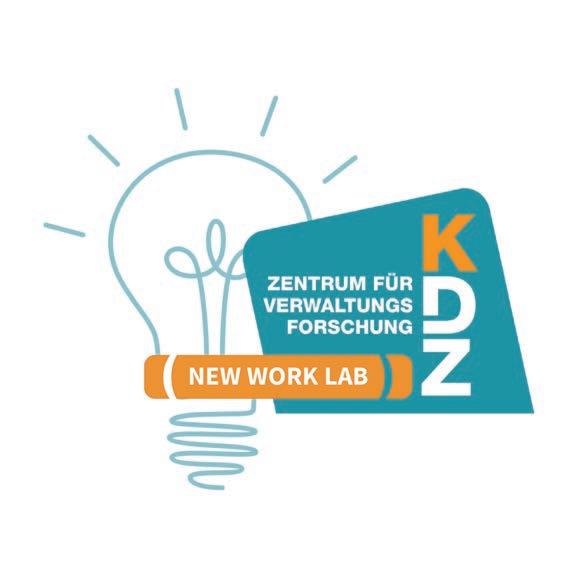
A fundamental rule of the Design Thinking method for the promotion of innovations states: Complex problems call for creative solutions.
The New Work Lab of KDZ follows this principle and works together with public administrations to develop innovative solutions for their most pressing future challenges. According to KDZ, the biggest concern for most cities and municipalities – beyond financial constraints – is the looming shortage of staff. Our response: Leverage the attractiveness of the public sector as an employer and retain your employees sustainably through innovation and continuous development.
Using a proven and research-driven methodology, the Lab begins by analysing each organisation’s specific challenges through a self-assessment. In this assessment, employees are asked to evaluate their organisation’s strengths and identify potential areas for action. Taking an internal perspective, this analysis can be expanded with additional evaluation steps if needed. Aside from analysing the current state, the desired target
state is outlined. This comparison of the two perspectives is then thoroughly scrutinised in a workshop and provides the foundation for further development. Using recognised creativity and innovation methods, specific solutions are developed for the organisation’s priority domains. At the end of the lab process, participants receive actionable proposals to make their public administration more attractive for the long term.
We at KDZ aim to encourage and empower public administration to proactively build its own organisational future, to adopt a responsible approach towards its current and future employees, and to enhance the public sector’s appeal as an employer.
Employees are the public administration’s most valuable asset. That is why we follow these guiding rules: Going forward, working together should be creative, inspiring, and sustainable. Well thought out solutions are needed rather than short-lived trends. Work in the public sector can and should provide both employees and management a sense of purpose.

Lately, the corporate world has been heavily focused on non-financial sustainability reporting, which will need to be implemented in the coming years. While municipalities are not yet legally required to comply with ESG criteria or the EU taxonomy rules, these requirements are also expected to become relevant for municipalities in the medium term, particularly when they apply for loans and funding.
If municipalities can already provide voluntary ESG and taxonomy verification for their projects today, this may improve their position when negotiating better financing conditions. In support of this, KDZ has developed a sustainability checklist at the request of Bank Austria, which is designed to assist municipalities in securing external funds for their projects.
As a project-based questionnaire, the sustainability checklist gives municipalities a tool to assess and document their investment projects on the basis of ESG criteria and the EU’s environmental taxonomy. The checklist consists of yes-or-no questions that need to be answered. Once completed, it provides a structured overview of an investment project’s sustainability, both externally and internally. Externally, the checklist can be used as a source of additional arguments when negotiating with financing institutions. Internally, it helps municipalities fine-tune their projects, for example, with a view to mitigating follow-on costs. In its present form, the checklist can be used for investment projects involving the construction and renovation of buildings as well as the construction and renovation of sewage and drinking water systems.
All municipalities can download the sustainability checklist for free on the KDZ platform www.praxisplaner.at. Apropos of financing opportunities: The ‘Municipal Sustainability’ web portal of the Austrian Association of Cities and Towns (https://sdg.staedtebund.gv.at/) is well worth exploring. This exchange platform on sustainability topics designed for municipalities provides additional tools and best-practice examples as well as up-to-date funding information and calls for the submission of proposals for sustainable projects.
Digitalisation is a complex endeavour, but ideally, it should also help address many organisational and substantive challenges.
As more and more municipalities move toward digitalisation, it is becoming increasingly necessary to consider the organisational aspects of this transition. The focus should not be on software-related aspects or electronic workflow concerns per se, but rather on developing an awareness for the following questions:
• Can long-standing organisational structures still meet the demands of modern collaboration, or should they be reimagined?
• Do I have the right in-house competencies?
• What additional guiding principles are needed for digital collaboration?
• What should future electronic file structures look like?
• How should key processes be organised?
• ...
In response to the ever-increasing demand for support in these topics, our ‘digitalisation projects’ have supported numerous cities and municipalities in their implementation work over the past year. We will continue to be available in 2025 to assist with organisational aspects of digitalisation, ensuring that digital transformation becomes a success and encourages further improvements in public administration.
Finally, a brief look ahead: How digital will Austria’s cities and municipalities become in the future? From our perspective, the answer is ‘comprehensively’ –not only in their own administration but also in their interaction with citizens.
As we enter 2025 and look to the future beyond, digital systems will play an even greater role in municipalities.
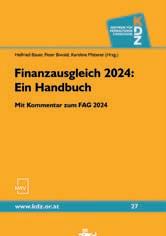
Our manual on the fiscal equalisation system takes an in-depth look at Austria’s fiscal equalisation system and the need to reform it. The first part of the book outlines the fundamentals of fiscal equalisation, setting out the definition of fiscal equalisation in a federal state, providing an overview of financial relationships, offering an explanation of the constitutional foundations of public finance, and presenting a summary of current reform needs. The manual’s main focus is a commentary on the Fiscal Equalisation Act 2024 (FAG 2024) and the related agreement (‘Paktum’), supplemented by statements on the FAG 2024 from the negotiating parties and interest groups. In the final section, it examines the further development needs in fiscal equalisation. Alongside a comprehensive assessment of the FAG 2024, specific reform aspects are considered in greater detail, including task- and goal-oriented funding, fiscal rules, municipal autonomy, burden sharing – with Switzerland as an example –healthcare reform, climate action, or land take. In closing, the publication offers the editors’ recommendations regarding the future development of fiscal equalisation.

Biwald, Peter; Jonas, Marion; Bauer, Helfried: Finanzielle Ausstattung und Leistungsfähigkeit der Stadt Graz im Vergleich.
(financial resources and performance capacity of the City of Graz: a comparative analysis)
Vienna, Graz, 2024
Prorok, Thomas; Schantl, Alexandra; Hochholdinger, Nikola; Weixlbraun, Verena: Public Value der österreichischen Sozialversicherung. (public value of the Austrian social insurance system) Vienna, 2024.
Hochholdinger, Nikola; Maimer, Alexander; Mitterer, Karoline; Pichler, Dalilah; Schantl, Alexandra; Yildirim-Metz, Kesira: Klimaschutz und Klimawandelanpassung in Österreichs Städten und Gemeinden.
(climate protection and climate change adaptation in Austrian cities and municipalities)
Vienna, 2024.
Prorok, Thomas; Stafa, Elton; Calzola, Sofia: Hungarian Local Government Finances: The Impact of the Local Business Tax and the Solidarity Contribution. 2024
Pichler, Dalilah; Biwald, Peter: Öffentliche Kulturausgaben im Bundesländervergleich. (public spending on culture by Land) Vienna, Innsbruck, 2024
Prorok, Thomas; Stafa, Elton; Elezi, Shiret: Fiscal Decentralization Indicators for Southeast Europe. 2024
Jonas, Marion; Biwald, Peter; Mitterer, Karoline; Pichler, Dalilah: Stadtdialog – Österreichische Gemeindefinanzen 2024 –Entwicklungen 2013 bis 2027.
(urban dialogue – Austrian municipal finances 2024 – developments from 2013 to 2027) Vienna, 2024.
Mitterer, Karoline: Finanzausgleich kompakt 2024 – Factsheets zum Finanzausgleich mit Fokus auf Gemeinden. (fiscal equalisation compact 2024 – fact sheets on fiscal equalisation with a focus on municipalities) 2024
Mitterer, Karoline; Haydn, Marian; Hochholdinger, Nikola: Quo vadis elementare Bildung. (what lies ahead for early childhood education) Vienna, 2024.
Hochholdinger, Nikola; Jonas, Marion: Stakeholderanalyse des Tätigkeitsumfelds der Koordinierungsstelle für Energiearmut.
(stakeholder analysis in the work environment of the energy poverty coordination office) Vienna, 2024.
INFORMATION AND ORDERING
Martina Henickl
Anna Schubert bibliothek@kdz.or.at
OUR OFFICE IS LOCATED IN VIENNA. WE‘RE PRESENT ACROSS AUSTRIA AND EUROPE.
KDZ – Centre for Public Administration Research
Guglgasse 13, 1110 Vienna
Phone: +43 1 8923492
E-mail: institut@kdz.or.at www.kdz.eu
Stay tuned, join the discussion, and follow us on facebook.com/kdz.or.at bsky.app/profile/kdzaustria.bsky.social www.linkedin.com/company/KDZ www.instagram.com/kdz_austria/
MEMBER SERVICES
www.kdz.eu/en/kdz/membership
Our members benefit from special services and preferential rates. We assist in nurturing relationships with member municipalities and institutions, and we strengthen your network Association office: Miriam Taumberger, taumberger@kdz.or.at
KNOWLEDGE CENTRE
www.kdz.eu/en/knowledge
An extensive literature and library service is available to our members.
Contact us: bibliothek@kdz.or.at
KDZ PLATFORMS
5,659
SUBSCRIBERS
RECEIVE THE KDZ NEWSLETTER.
praxisplaner.at offenerhaushalt.at caf-centre.eu bacid.eu stadtregionen.at verwaltungskooperation.at
NEWSLETTER
We highlight current topics in the public sector and offer insights into our work. Subscribe to our free newsletters on our website. Registration: www.kdz.eu/en/kdz/newsletter
FORUM PUBLIC MANAGEMENT
www.kdz.eu/de/wissen/fpm
Our professional journal Forum Public Management covers key topics twice a year.

